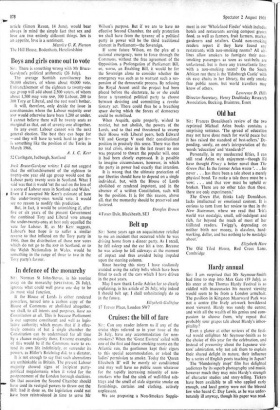In defence of the monarchy
Sir: Norman St John-Stevas, in his routine essay on the monarchy (SPECTATOR, 26 July), ignores what could well prove one day to be its most vital function.
If the House of Lords is either rendered powerless, turned into a carbon copy of the House of Commons or abolished altogether, we shall, to all intents and purposes, have no Constitution at all. This is because Parliament is our supreme constituent and well as legis- lative authority; which means that if it effec- tively consists of but a single chamber the Constitution can be undermined for all time by a chance majority there. Extreme examples of this would be if the Commons were to ex- tend its own life indefinitely, or surrender its powers, as Hitler's Reichstag did, to a dictator.
It is not enough to say that such aberrations are unthinkable in Britain. The present Labour majority showed signs of incipient party- political megalomania when it voted for the postponement of the London borough elections. On that occasion the Second Chamber should have used its vestigial powers to throw out the Bill; had it done so, the legislation could not have been reintroduced in time to serve Mr Wilson's purpose. But if we are to have no effective Second Chamber, the only protection we shall have from the tyranny of a political party in power will be the third traditional element in Parliament—the Sovereign.
If some future Wilson, on the plea of a national emergency, were to force through the Commons, without the free agreement of the Opposition, a Prolongation of Parliament Bill, or, worse, an Enabling Bill, it would be for the Sovereign alone to consider whether the emergency was such as to warrant such a sus- pension of the democratic process. By refusing the Royal Assent until the project had been placed before the electorate, he or she could force a tyrannical political party to choose between desisting and committing a revolu- tionary act. There could thus be a breathing space during which the forces of democracy could be mobilised.
When Asquith, quite properly, wished to restrict, but not abolish, the powers of the Lords, and to that end threatened to swamp their House with Liberal peers, both Edward VII and George V used their constitutional position in precisely this sense. There was then no real crisis, since in the last resort no one was prepared to thwart the popular will, once it had been clearly expressed. It is possible to imagine circumstances, however, in which the party in power had exactly that intention.
It is wrong that the ultimate protection of our liberties should have to depend on a single individual, but, with the House of Lords abolished or rendered impotent, and in the absence of a written Constitution, such will be the position. It is for this reason, above all, that the monarchy should be preserved and fostered.






































 Previous page
Previous page